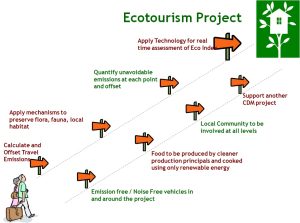Eco-tourism, a burgeoning sector within the global travel industry, has emerged as a vital component in the pursuit of sustainable development. As the world grapples with the challenges of climate change, biodiversity loss, and cultural preservation, eco-tourism offers a promising avenue for promoting environmental stewardship, socio-economic benefits, and cultural exchange. This article delves into the future of eco-tourism, examining its potential, challenges, and the strategies necessary to ensure its growth aligns with sustainability principles.
The Evolution of Eco-Tourism
Eco-tourism, defined as responsible travel to natural areas that conserves the environment and improves the well-being of local people, has evolved significantly since its inception in the late 20th century. Initially perceived as a niche market, eco-tourism has gained mainstream traction, driven by increasing environmental awareness and a growing demand for authentic travel experiences.

Market Trends and Consumer Behavior
The future of eco-tourism is closely tied to evolving market trends and consumer behavior. Today’s travelers are more informed and conscientious, seeking experiences that minimize their ecological footprint while maximizing positive impacts on local communities. This shift is reflected in the rise of slow travel, voluntourism, and immersive cultural experiences.
Technological Innovations
Technology plays a pivotal role in shaping the future of eco-tourism. Innovations such as virtual reality (VR) and augmented reality (AR) offer immersive pre-travel experiences, allowing potential tourists to explore destinations virtually before making travel decisions. Additionally, advancements in sustainable transportation, renewable energy, and waste management are crucial for minimizing the environmental impact of eco-tourism.
Policy and Regulation
Effective policy and regulation are essential for the sustainable growth of eco-tourism. Governments and international organizations must collaborate to establish guidelines that promote environmental conservation, protect cultural heritage, and ensure fair economic distribution. Incentives for sustainable practices, such as tax breaks for eco-friendly accommodations and certifications for responsible tour operators, can further drive the industry’s growth.
Community Involvement and Empowerment
The success of ecofriendly tourism hinges on active community involvement and empowerment. Local communities must be at the forefront of eco-tourism initiatives, benefiting directly from the economic opportunities it generates. Capacity-building programs, equitable revenue-sharing models, and community-led conservation projects are vital for fostering local ownership and long-term sustainability.
Challenges and Mitigation Strategies

Despite its potential, eco-tourism faces several challenges that must be addressed to ensure its sustainable future. Over-tourism, habitat degradation, and cultural commodification are significant concerns. Mitigation strategies include implementing carrying capacity limits, promoting off-the-beaten-path destinations, and fostering responsible visitor behavior through education and awareness campaigns.
Case Studies and Best Practices
Examining successful ecofriendly tourism models provides valuable insights into best practices. Destinations such as Costa Rica, Bhutan, and New Zealand have pioneered sustainable tourism initiatives, balancing environmental conservation with socio-economic development. These case studies highlight the importance of integrated planning, stakeholder collaboration, and adaptive management in achieving eco-tourism success.
The Role of the Private Sector
The private sector plays a critical role in advancing eco-tourism. Businesses can adopt sustainable practices, invest in green infrastructure, and support conservation efforts. Public-private partnerships can drive innovation, scale sustainable solutions, and create a competitive advantage for eco-friendly enterprises.
Future Outlook and Recommendations
The future of ecofriendly tourism is promising, with significant potential for growth and positive impact. To realize this potential, stakeholders must prioritize sustainability, foster collaboration, and embrace innovation. Key recommendations include:

– Developing comprehensive sustainability frameworks that integrate environmental, social, and economic dimensions.
– Enhancing community engagement and capacity-building to ensure local benefits.
– Leveraging technology to improve efficiency, reduce impacts, and enhance visitor experiences.
– Promoting responsible marketing and visitor education to foster sustainable travel behavior.
– Encouraging cross-sector collaboration to address systemic challenges and drive collective action.
Conclusion
The future of eco-tourism lies in its ability to balance the needs of travelers, local communities, and the environment. By adopting a holistic, multi-stakeholder approach, ecofriendly tourism can serve as a catalyst for sustainable development, fostering a harmonious relationship between people and the planet. As the industry continues to evolve, its success will depend on our collective commitment to preserving the natural and cultural treasures that make eco-tourism a truly enriching experience.




